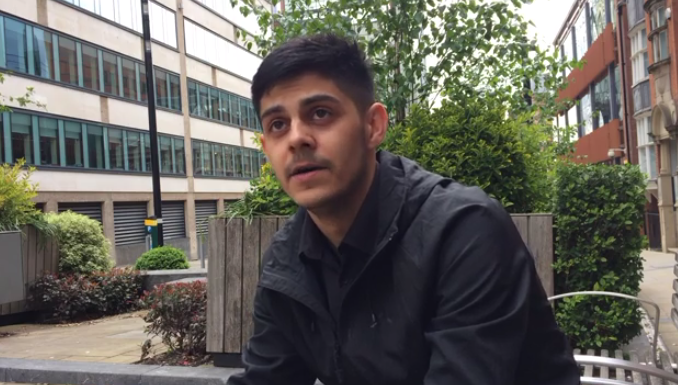It’s unclear when unpaid trial shifts became a thing in the UK. The Trades Union Congress, representing England and Wales, has only become aware of the practice in the last 10 years, through complaints made by workers.
The Office of National Statistics does not track unpaid trial work or any form of unpaid labour, so data on the issue is scarce.
But a search of “trial shift” on Twitter for a two-week period in May brings up 126 tweets, 63 percent of which were confirmed to be located in the UK.
Many of these tweeting, job-seeking hopefuls fall into Gen Z, those post-Millennial young adults still under the age of 24. They tweet about their anxiety before a trial shift, how friendly the people they worked with were, and whether they hope they get the job. Trial shifts aren’t generally traumatic for this cohort, they’re just life.
“I don’t have a choice”
Stella is 18, and she recently scored her first bartending job in Glasgow after a successful three-hour Friday night trial shift.
Technically they didn’t tell her the trial was unpaid, but she’s not expecting to receive wages for those hours. She’s heard from friends in the hospitality industry that unpaid trial shifts are the norm.
“I’m fine with it because in any case I don’t have a choice, and also I get to see if it’s a place I would like to work in or if it’s a pass,” Stella said.
When done fairly, a trial shift is the best way for managers to hire good employees and for employees to choose the right fit, according to former restaurant manager George Janackovic.
But young people have simply accepted that they don’t get a choice in the matter. Luke is 23 and lives in Bristol, and he’s been unemployed for six months. He was in need of work when he accepted a trial shift as a kitchen porter at a chain restaurant.
The manager told him it would be unpaid unless he got the job. The three-hour shift was tough, but went well, Luke said. During a chat with the head chef, Luke was initially told he’d get a call after another person’s trial shift — but the chef had a change of heart and gave Luke four shifts to start working the upcoming week.
“Though I hadn’t signed any paperwork, a handshake is considered a done deal as far as I’m concerned,” Luke said.
That quickly fell apart when Luke showed up for his first shift and the head chef was on holiday.
Suddenly Luke found out that the other person had been hired, he still had no job, and he’d paid for a second return bus trip on top of losing out £24 in wages for the trial shift.
He was given a vague reassurance that there would be other openings and he may get a later offer.
“I’m still very angry with them,” Luke said. “Honestly hoping they do call me back just so that I can tell them where to stick it.”
A hole in the economy that no one is tracking
There were 93,000 vacancies in the ONS “accommodation and food service activities” employment category for Feb-April 2019. If one 21-24 year old worked a 3-hour unpaid trial shift for just half of those vacancies, the work would amount to more than £1 million in missing wages in that single employment category for the quarter.
Unpaid trial shifts are just one piece of a 30-year trend in declining workers’ rights — and disregarding the moral implications, it’s not good for the economy, labour economist Dr Eleni Papagiannaki said.
“It is inefficient because if you had paid these employees’ salary, it means they would have spent this money directly, paying for the rent, buying food, clothes, whatever,” Papagiannaki said.
The money adds up for young adults like Nottingham resident Collette, 21.
She estimates that she’s worked 24 hours of unpaid trial shifts over the last few years, all in hospitality.
Her jobs in the care industry have not required trial shifts.
And along with the wages, 23-year-old Rebecca in Manchester points out that it’s time and energy and hope as well.
Rebecca said she left a three-hour bartending trial with the impression that the job was hers. She’d had a great time, and the management staff seemed keen to hire her.
But the phone call they promised her never came.
“I think it should be protocol to follow up with somebody who took the time to do a trial shift because it’s honestly a horrible feeling to be waiting by the phone all day to not receive a call,” Rebecca said. “Especially after being told for definite that you would.”
Former restaurant manager Janackovic admitted that he’s heard other managers refer to trial shifts openly as “slave labour,” intentionally using unpaid trials to help cover the busy Christmas period or a staffer’s illness.
Rebecca has been left feeling like she fits that description — she’s had two trial shifts on a bank holiday and for a major event where she left expecting a phone call with a job offer, but never heard from them again.
“This made me think that maybe they wanted somebody to help out over a busy event with no real intention of hiring them afterwards.”
A version of this article was first published on Amanda Loviza’s Medium site.

